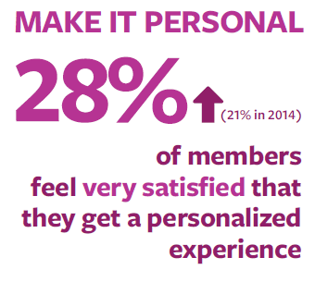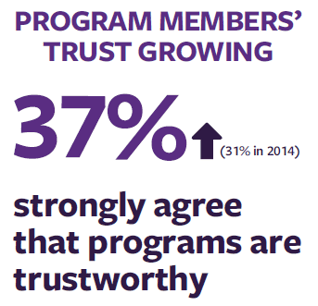Bond
The Future of Data-Driven Marketing
A few months ago, I was asked what my vision of the future of marketing would be for when my 3.5-year-old son becomes an adult. This sparked my imagination and I felt compelled to share my vision of the future of marketing. Being a data-driven marketer myself, I realize that this vision is slightly utopian, and I don’t know how many years it will take for this vision to be realized in reality. Regardless, I would love to play a key role in making this dream come true.
The young man asking this question elaborated to ask whether I believe my son will be bombarded with too many messages and too much information when he comes of consumer age, which frankly I believe has already started. My simple answer at the time was “no.” By the time he becomes an adult, all content will be curated for and by him.  Even today, we have the technology to personalize all content. Just a few years ago, this meant knowing who the customer was and targeting the message to her. In this day and age, we can go far beyond knowing “who.” We can push personalization to “where” and “when.” With the consumer carrying her mobile phone on her person virtually 24 hours a day, I know not only who she is, but I know where she is and even the time and the weather in her exact location.
Even today, we have the technology to personalize all content. Just a few years ago, this meant knowing who the customer was and targeting the message to her. In this day and age, we can go far beyond knowing “who.” We can push personalization to “where” and “when.” With the consumer carrying her mobile phone on her person virtually 24 hours a day, I know not only who she is, but I know where she is and even the time and the weather in her exact location.
One of my former colleagues uses these examples in his speaking engagements:
- If you get an email from a hardware store for paint sale at 10 a.m. on Wednesday, how likely would you be to act on it?
- On the other hand, what if you got a coupon for pizza delivery at 4:30 on Friday? That seems like a better message.
- Or even better… knowing that I shouldn’t send you a coupon for a car wash today because I know it’s raining where you are. How is that for sophistication?
We, as marketers of today have all this vast data and information at our disposal, but admittedly, we don’t have the means, knowhow or technology to personalize communication to this extent. The 2015 Loyalty Report that we recently published shows that only 28% of loyalty program members are very satisfied that they get a personalized experience. And that’s loyalty program members: the cream of the crop of a company’s customers!
The issue is that we do have the means and the technology but not necessarily the knowhow to bring complete personalized communication to life. If you will allow me, I will elaborate on my dream and vision and push it further into the future.
The marketing world I envision is all grounded in data, where data rules. In fact, I see the value of data following a normal distribution bell curve, whereby its value grows exponentially over a number of years, reaching its peak and then starting to trail off. Why, you ask? If all business-related decisions are to be rooted in customer data, it would certainly be of incredible value to any organization, whether for profit, government or not for profit. Then, what I envision is a single, universal database of individuals that is hyper-connected and contains all information about me, per se: my online activities and purchases, my offline purchases, all information from my health tracking device and potentially my health as well, social media and preferences, etc. As a consumer, I would have access to this database and be able to edit any information and control what data gets shared, with whom and for what purpose. Then any organization, including my doctors and hospitals, would have access to this data to create content that is very specific to me. This means a complete shift in mindset, a democratization of data (similar to how information was democratized by the Internet) and eventually a commoditization of data.
What would this look like in practice, then? It would mean that all content and advertising would be very specific to who I am, where I am and when I am. I would be in charge of what I receive. This would go much further than marketing and advertising: this would extend to merchandising (think Tom Cruise in Minority Report) that would take me to the store where I would find what I need or have it pre-ordered for me in a predictive fashion, personalized pricing, and so on. We can even take it outside the B2C world and think of healthcare: I would work collaboratively with my team of doctors to establish preventative care, because now my doctors are working as a team and have real-time access to my vitals, my food and water intake and my exercise. Think of the education realm. Courses are now structured uniquely based on my career goals, skills, talents, growth opportunities and interests, and I am in charge of my curriculum. Hiring and talent retention becomes a matter of algorithms.

This world is very utopian, as I mentioned earlier. It does have its limitations. How narrow is too narrow? Would I miss out on general information and knowledge? Would I walk through the world with blinders on? Would the world not need any more human interaction and would be driven by business rules, which are only as good as our ability to hypothesize on the use of data? Even in my world demands balance.
With great power comes great responsibility, as Peter Parker’s Uncle Ben stated. We have the great responsibility of protecting the privacy of our consumers or risk being creepy (have you heard of the failed mobile app Girls Around Me? For some more salient points, read Bond’s The 2014 Loyalty Report on page 21).  There are worse things than being creepy though… without protecting privacy, we lose our customer’s trust; I don’t even need to explain the implications of that. On the other hand, when we use customer data in a way that adds value to the customer, they are more willing to share more data with us: I call that a win/win.
There are worse things than being creepy though… without protecting privacy, we lose our customer’s trust; I don’t even need to explain the implications of that. On the other hand, when we use customer data in a way that adds value to the customer, they are more willing to share more data with us: I call that a win/win.
In any event, I am very excited about the future. Today’s Millennial and, even more so, Generation Z consumers will demand that we move closer to this direction and I’m thrilled about the opportunity to play a key role in shaping the vision and the realization of the future of data-driven marketing. In my role as a loyalty consulting director, I get to help companies create programs that deliver value to the consumer and put the consumer in the driver’s seat of information flow.